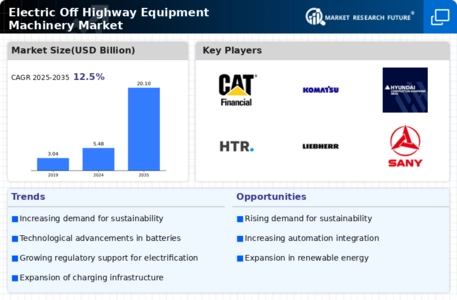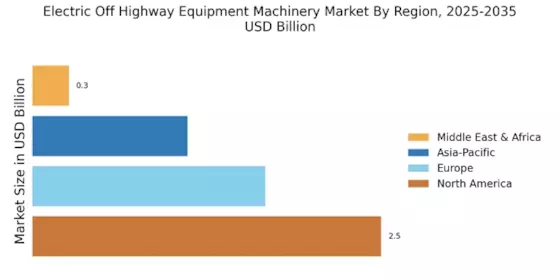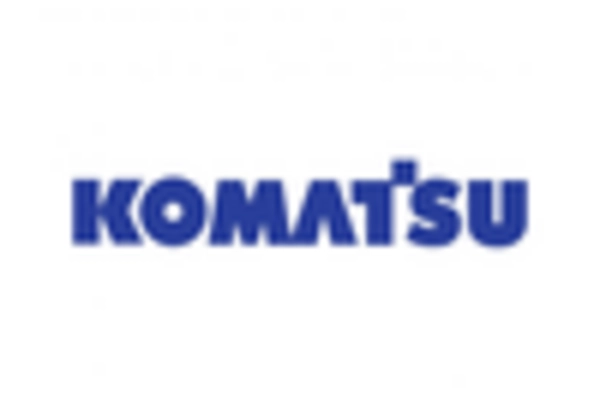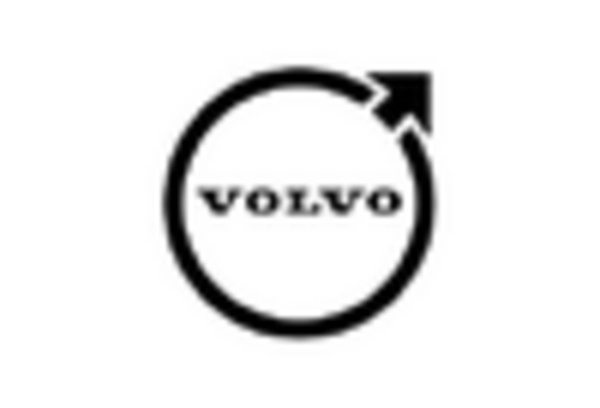Government Incentives and Support
Government policies and incentives are crucial drivers for the Electric Off Highway Equipment Machinery Market. Many governments are implementing financial incentives, such as tax credits and grants, to encourage the adoption of electric machinery. These initiatives aim to reduce reliance on fossil fuels and promote cleaner technologies. For example, recent legislation in several regions has allocated substantial funding for the development and deployment of electric off-highway equipment. This support not only lowers the initial investment barrier for companies but also fosters innovation within the industry. As a result, the market is expected to witness a significant increase in new entrants and product offerings.
Increased Demand for Sustainable Solutions
The Electric Off Highway Equipment Machinery Market is experiencing a notable surge in demand for sustainable solutions. This trend is largely driven by the growing awareness of environmental issues and the need for reduced carbon emissions. As industries seek to comply with sustainability goals, electric off-highway machinery presents a viable alternative to traditional diesel-powered equipment. Recent data indicates that the market for electric machinery is projected to grow at a compound annual growth rate of approximately 15% over the next five years. This shift not only aligns with corporate social responsibility initiatives but also enhances operational efficiency, making electric machinery an attractive option for various sectors.
Rising Fuel Costs and Operational Efficiency
The Electric Off Highway Equipment Machinery Market is also influenced by rising fuel costs, which compel companies to seek more cost-effective solutions. Electric machinery typically offers lower operational costs compared to traditional diesel equipment, primarily due to reduced fuel expenses and lower maintenance requirements. As fuel prices continue to fluctuate, the economic advantages of electric machinery become increasingly apparent. Industry analyses suggest that companies can save up to 30% on operational costs by transitioning to electric equipment. This financial incentive is likely to drive more businesses to invest in electric off-highway machinery, further expanding the market.
Growing Focus on Safety and Health Regulations
The Electric Off Highway Equipment Machinery Market is significantly impacted by the increasing emphasis on safety and health regulations. As industries strive to create safer work environments, the adoption of electric machinery is seen as a proactive measure to mitigate risks associated with diesel emissions and noise pollution. Regulatory bodies are tightening standards, which encourages companies to transition to cleaner technologies. The shift towards electric equipment not only complies with these regulations but also enhances worker safety and health. Consequently, this trend is expected to propel the market forward, as businesses prioritize compliance and employee well-being.
Technological Innovations in Electric Machinery
Technological advancements play a pivotal role in shaping the Electric Off Highway Equipment Machinery Market. Innovations in battery technology, electric drivetrains, and automation are enhancing the performance and efficiency of electric machinery. For instance, the introduction of high-capacity batteries has significantly extended the operational range of electric equipment, making them more competitive with their diesel counterparts. Furthermore, the integration of smart technologies, such as IoT and AI, is optimizing equipment management and maintenance. As these technologies continue to evolve, they are likely to drive further adoption of electric machinery, potentially increasing market penetration by 20% in the coming years.


















